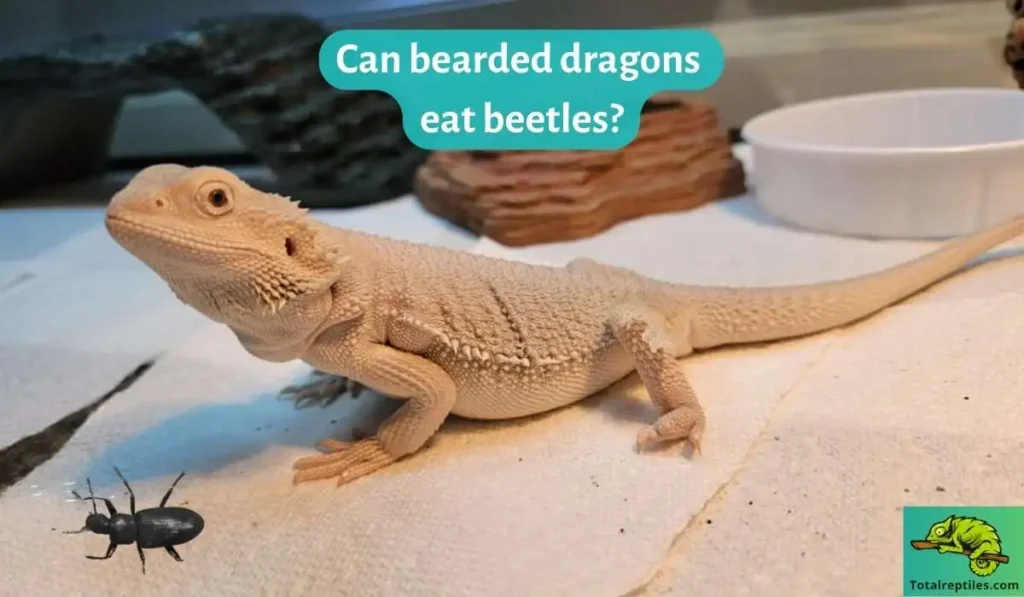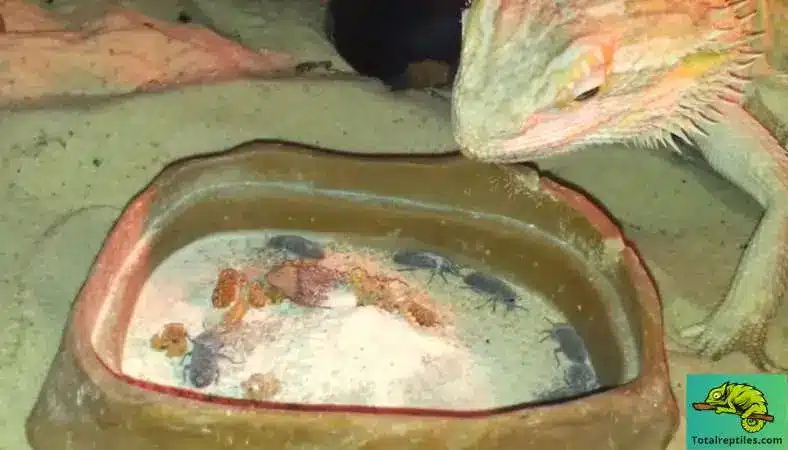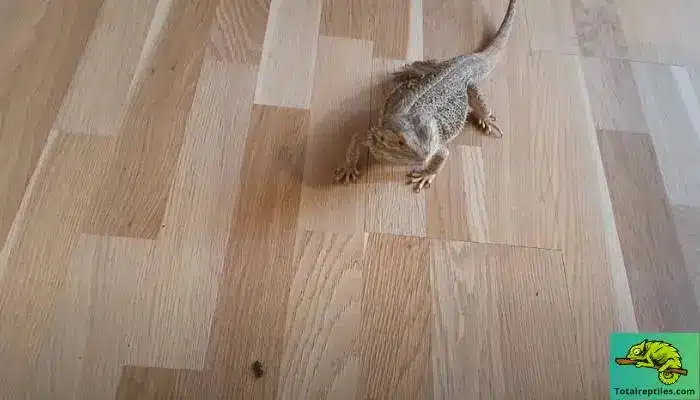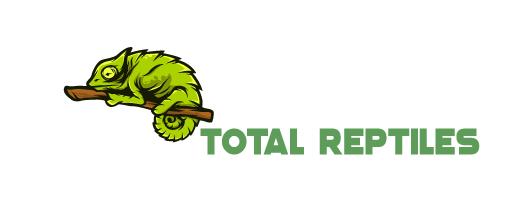Beardies, or bearded dragons, are famous for their calm behavior and easy-maintaining habits. However, new pet owners are often stumped when it comes to providing nutritional snacks/meals.
One such issue that occurs is regarding insects. Can bearded dragons eat beetles without any health problems?
Both captive and wild beardies can consume beetles as part of their protein intake. However, this diet will vary based on the range of beetles, their forms, and how they balance the overall diet.
Plus, you need to ensure the beetle species you pick is safe for the dragon. Below is an in-depth overview of the subject.

Can Bearded Dragons Eat Beetles?
The great news is that Pogona vitticeps, or bearded dragons, are opportunistic predators. As a result, they will eat what is available in the region/vivarium, including beetles.
Therefore, their diet can be inconsistent with one another based on their residing locations. This is also why they will accept whatever items you provide.
So, you should know how to consider a balanced diet for a bearded dragon, as different owners offer varied options. Here is what a survey for a study discovered:
| Nutrition Type | Subadult/Adult Bearded Dragons | Common Diet Balance |
| Plant Matters | Between 51% and 75% | <50% |
| Animal Matters (Insects) | Between 1% and 25% | >50% |
Insects are excellent nutrient sources, making beetles a preferable option. However, there are toxic or hard kinds that may be harmful to your beardie. It is good to do research before placing one in the tank.
Want to learn more about the bearded dragon diet:
Can bearded dragons eat dead crickets?
Can bearded dragons eat spiders?
Can Bearded Dragons Eat Buffalo Beetles?
You can give buffalo beetle larvae to your bearded dragon and watch if it enjoys them. Start with one at a time to prevent impaction, constipation, and other health problems.
On a positive note, buffalo or cleaner beetles have softer shells than mealworms, allowing easier digestion. Thanks to this advantage, you may even give these to baby beardies as infrequent snacks!
They are also packed with certain nutrients. Nevertheless, it lacks calcium, so the experts suggest dusting supplement powders before serving.
Can Bearded Dragons Eat Darkling Beetles?
As much as Darkling beetles (Tenebrionidae) are a popular choice for snacks, all species in the category are not recommended for bearded dragons.
At a glance, the family contains more than 20,000 species. So, it can be a difficult task to figure out which ones are best for your pet. Hence, it is wiser to offer Darkling beetles in their larval form.
On the other hand, larvae have a greater fat content, a sheer cause of nutritional imbalance for the dragons.

Also, some types are safe to give as a larva or mature stage, while others can be a red flag. Consult your vet before feeding the beardie an unknown species.
Can Bearded Dragons Eat Black Beetles?
Black beetles are another intriguing member of the Darkling beetle family. Therefore, it is safe to say that black beetles, in their larval form, are okay to give your lizard.
Always note the fact that larvae contain more fat than mature beetles, even if they are black beetles. So keep a close eye on the amount you provide.
Adult black beetles have tougher shells that can lead to severe impaction upon ingestion. Darkling beetles (larvae) are better given to adult dragons than juveniles.
Can Bearded Dragons Eat Fruit Beetle Grub?
Our systematic research on the subject has established that fruit beetle grubs are one of the most favored treats by adult bearded dragons.
They are small and soft-bodied insects that feed on moist peat, leaf mulch, or small fruit items. It will keep them fresh and plump before serving them to the dragons.
These grubs are easy to munch on and keep a beardie belly full. But they are not a substitute for regular meals and should be given only occasionally. Adult bearded dragons can consume mature fruit beetles as well, but not as many as the grubs.
Can Bearded Dragons Eat Mealworm Beetles?
Yes, your dragon can eat one or two mealworm beetles that have reached maturity. However, check on the lizard for the next few days to ensure its eating habits and bowel movements are normal.
Did you know mealworm beetles contain more energy and nutrition than their larvae? But you have to see which option your dragon prefers the most.
Since the beetles move about too often, we recommended putting them in the refrigerator for five minutes after placing them inside a sealed plastic bag. Then serve the insect to the beardie.
It reduces their fleeing capability while giving your pet the upper hand in capturing it faster.
How to Prepare Beetles for Bearded Dragons?
Preparation and research are key to delivering healthy snacks to your lizard pet. With our expertise in this field, we have determined that there are two optimal ways of serving the beetles.
Remember, beetles should not be the main source of nutrients. The majority of the diet should have plant matter, as dragons love varied meal plans.
| Larval Stage | 1. Mealworms or super worms 2. Easy to feed to the dragons due to the wriggly form 3. Scoop a moderate amount into a bowl along with a slice of apple. 4. Serve the bowl to the dragon 5. The apple keeps the larvae fresh 6. The beardie will consume the apple and the worms |
| Matured Stage | 1. A fully formed beetle for adult dragons 2. Best to enclose it in a sealed plastic bag and refrigerate it for 5 minutes 3. The low temperature slows the beetle’s movement while it is still alive 4. Dragons will find it easier to catch the beetle |
How Many Beetles Can Bearded Dragons Eat?
Drawing from our comprehensive research, we have been able to ascertain that beetle quantities for feeding purposes differ according to the dragon’s age.
So, this is what you should remember:

- Avoid giving beetles to baby beardies. They cannot crush the hard chitin shells of the beetles.
- Limit the number of larvae (mealies or super worms) for the juveniles as well. However, they are at a stage of rapid growth, so they have an alternate source of insect matter to prevent deficiencies.
- Stick to 1-2 mealworms per week or 3-5 super worms per week for juvenile bearded dragons.
- Adults can consume less as they are not as aggressive as juveniles. Simply 1 or 2 beetles or larvae a week will suffice.
- Do not feed adult/matured beetles to juvenile dragons.
Types of Beetles Bearded Dragons Can Eat
Although bearded dragons are not picky, their owners should consider what snacks they noticeably enjoy. This is where you must ensure that you deliver the right beetle type. Hence, you should learn which ones are safer options for your pet.
Did you know there are over 40,000 different species?
Covering them all in this article will only make matters more complex, so we will go over the most common reptile feeders that are best for your dragon.
1. Mealworm Beetles (Tenebrio Molitor)
Technically, these are the species of Darkling beetles. Keep in mind that the Darkling beetle is not a single insect but a category referring to more than 20,000 species.
It is highly consumed in the wild by reptiles due to its high protein and low-fat profile. They are also rich in essential minerals. But are they good for the beardies?
Ideally, it is better to offer them fresh and larval forms. Both adult and juvenile dragons should have limited mealworms, as they are difficult to digest.
The smaller the mealworm is, the stronger its chitin shells will be. Plus, mealworm beetles have stronger shells. Provide as little as possible to prevent impaction.
A nutritional profile of mealworm beetles and mealworms might help you understand how many to give:
| Darkling Beetles/Dietary Aspects | Moisture | Protein | Fat | Ash | Suggested Feeding Quantity (Adult Bearded Dragons) | Suggested Feeding Quantity (Juvenile Bearded Dragons) |
| Mealworm Beetles | 61% | 26% | 7% | 2% | 1-2/week | Not Recommended |
| Mealworms (Larvae) | 62% | 19% | 13% | 1% | 4-6/week | 1-2/week |
2. Superworm Beetles (Zophobas Morio)
The superworm beetles are also part of the Darkling beetle category. They are fattier and more protein-packed than mealworm beetles.
However, the risk of impaction remains because of the hard chitin shells. It is great as an occasional treat rather than a regular meal plan. So add them to the diet in smaller amounts.
A nutritional profile of super worm beetles and mealworms might help you understand how many to give:
| Darkling Beetles/Dietary Aspects | Moisture | Protein | Fat | Ash | Suggested Feeding Quantity (Adult Bearded Dragons) | Suggested Feeding Quantity (Juvenile Bearded Dragons) |
| Superworm Beetles | 62% | 26% | 5% | 2% | 1-2/week | Not Recommended |
| Superworms (Larvae) | 58% | 20% | 18% | 1% | 2-3/week | 3-5/week |
Types of Beetles Bearded Dragons Should Avoid
On the contrary, not all species of beetles are safe for bearded dragons. While some are great for occasional snacks, others can pose real health risks or even be lethal for your dragons.
The list below shows what to avoid and why:
1. Japanese Beetles (Scarab)
Although many owners offer Japanese beetles (larvae) to their bearded snakes, we do not suggest them for dragons. They may not be highly toxic, but overconsumption of these beetles (larvae) can lead to various health problems.
Moreover, adult Japanese beetles are hard for beardies to consume without impaction.
2. Fireflies
Lighting bugs are amazing to behold, but that very same glow can be the cause of your dragon’s unexpected demise. These beetles contain lucibufagins toxins (glowing source) that are deadly for the heart muscle of a beardie.
3. Bees
An occasional bee as a treat is okay as long as it does not sting the pet. It all depends on the level of swift flexes your dragon possesses. But it is not worth the risk.
4. Wasps
Never allow your lizard to prey on wasps, as these are highly toxic and lethal to the digestive tract.
5. Stinging Ants
Avoid insects that are capable of stinging toxins into the lizard. Stinging ants, in particular, can inject venom or toxins into their prey when they sting.
This venom can cause pain, inflammation, allergic reactions, and even serious health issues or death in lizards, depending on the species and the sensitivity of the individual lizard.
6. Fire Ants
The level of folic acid in fire ants is too high to provide them with healthy treats. Opt for safer beetle species that do not cause illness or, worse, death to your pet.
7. Monarch Butterflies
Do not give monarch caterpillars or butterflies to the beardies because of the risk of toxins ingestion. These butterflies/caterpillars often come in contact with insecticides. So, it is better to avoid them completely.
Conclusion
So, can bearded dragons eat beetles without consequences? Our extensive knowledge and research have led us to conclude that certain beetle types are okay to feed your dragon.
However, it must not be over 50% of its usual diet. Feeding excessive beetles at once or too often will show signs of obesity, impaction, hyperparathyroidism, etc.
Additionally, take proper steps to avert potential injuries or stress caused by uneaten live insects.
Beetles can be difficult to chew for reptile pets, but their larvae can solve the problem. If your dragon loves these bugs in all forms and shapes, be sure to give them the freshest and juiciest ones to relish!
References
- Raiti, P. ‘Husbandry, Diseases, and Veterinary Care of the Bearded Dragon (Pogona Vitticeps)’, Journal of Herpetological Medicine and Surgery (2012).
- Dragojlović, D. (et al.), ‘Comparison of Nutritional Profiles of Super Worm (Zophobas morio) and Yellow Mealworm (Tenebrio molitor) as Alternative Feeds Used in Animal Husbandry: Is Super Worm Superior?’, Animals 2022.

